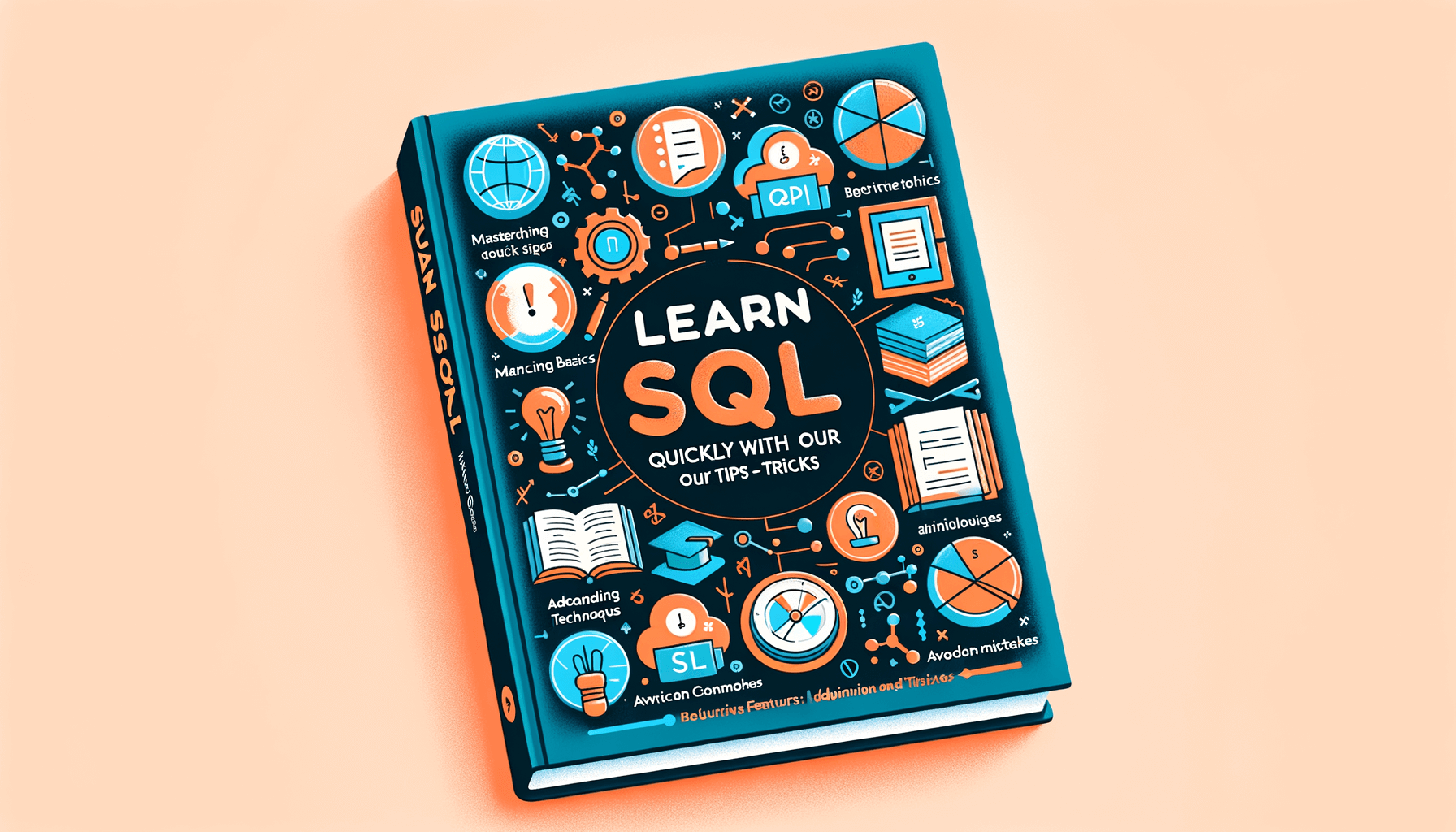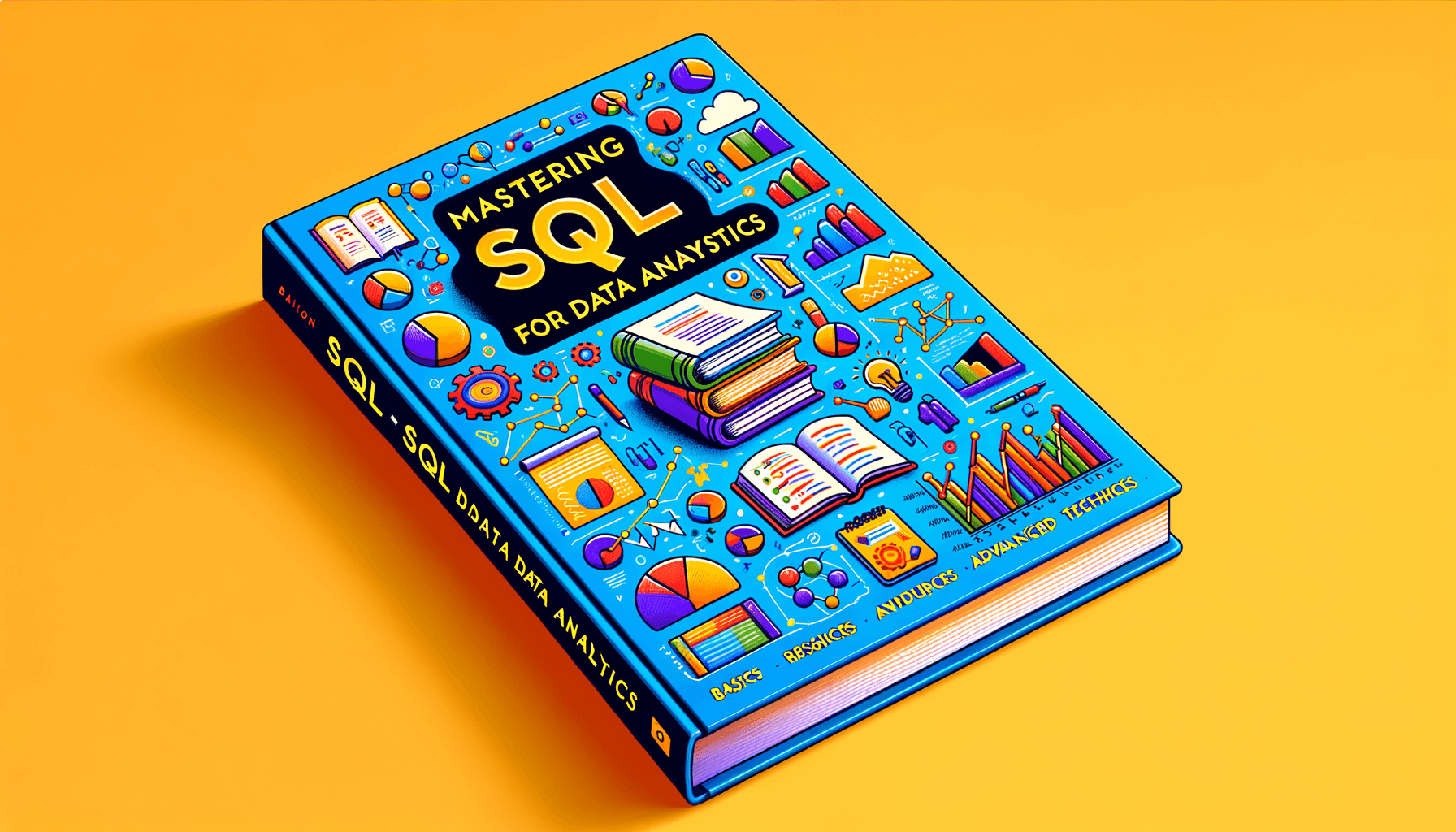A big variety of articles and resources

Can I learn SQL fast enough to get a job next week using it?
 Sia Author and Instructor
Learn SQL
Sia Author and Instructor
Learn SQL
12 minute read
Learning SQL quickly to land a job in just a week is a big challenge. But with the right plan and resources, it might be possible. This guide will help you understand the basics of SQL, set realistic goals, and find the best study tools. We'll also cover how to apply what you learn in real-world situations and get ready for job interviews.
Key Takeaways
- Understanding the basics of SQL is crucial for any data-related job.
- Self-evaluation helps identify what you need to learn.
- Setting realistic goals can make your learning process more effective.
- Choosing the right resources can speed up your learning.
- Practical application of SQL skills is important for job readiness.
Understanding the Basics of SQL
Defining SQL and Its Importance
SQL, or Structured Query Language, is a tool we use to talk to databases. It's like a special language that helps us ask questions and get answers from data stored in a database. Knowing SQL is important because many jobs need people who can handle data. If we can fit data & SQL skills into our busy life with micro-courses, we can master SQL basics quickly. This is perfect for beginners who want to learn at their own pace.
Core Concepts and Terminology
Before diving deep, we need to understand some key ideas and words in SQL. Here are a few important ones:
- Database: A place where data is stored.
- Table: A part of the database that holds data in rows and columns.
- Query: A request we make to get data from the database.
- Primary Key: A unique identifier for each row in a table.
By learning these terms, we can start to see how SQL helps us manage and use data effectively. No credit card required to start learning. Just login or sign up to begin.
Assessing Your Current Skill Level
Self-Evaluation Techniques
Before diving into SQL, it's crucial to understand where we stand. Knowing our starting point helps us set realistic goals. We can begin by asking ourselves a few questions:
- Have we ever worked with databases before?
- Do we understand basic programming concepts?
- How comfortable are we with writing and reading code?
Answering these questions honestly will give us a clearer picture of our current skill level.
Identifying Knowledge Gaps
Once we have a sense of our starting point, the next step is to identify what we need to learn. This involves pinpointing the areas where we lack knowledge. We can do this by:
- Reviewing SQL job descriptions to see what skills are required.
- Taking online quizzes or practice tests to assess our knowledge.
- Comparing our skills against a list of core SQL concepts.
By identifying these gaps, we can focus our learning efforts more effectively. This targeted approach ensures we spend our time wisely, concentrating on the areas that will make the biggest impact.
Setting Realistic Learning Goals
Time Management Strategies
When learning SQL quickly, time management is crucial. We need to break down our study time into manageable chunks. For example, we can dedicate mornings to theory and afternoons to practice. Using a timer can help us stay focused and avoid burnout.
Prioritizing Key Topics
To make the most of our limited time, we should focus on the most important topics first. This includes understanding basic SQL commands like SELECT, INSERT, UPDATE, and DELETE. By mastering these, we can build a strong foundation and tackle more complex concepts later.
It's essential to set clear, achievable goals for each study session. This keeps us motivated and on track.
We can also use resources like the [Jumpstart SQL: Free Introductory Lessons](pathname: /course/jumpstart-sql-free-introductory-lessons) to get a quick introduction to SQL. This course offers a solid foundation in database concepts, practical learning, and hands-on projects, all taught by an instructor with 25 years of experience.
Choosing the Right Learning Resources
Books and Online Courses
When it comes to learning SQL, selecting the right resources is crucial. Books and online courses offer structured learning paths that can help us grasp the fundamentals quickly. Books provide in-depth explanations and examples, while online courses often include video tutorials and quizzes to reinforce our understanding.
Interactive Tutorials and Practice Platforms
Interactive tutorials and practice platforms are excellent for hands-on learning. Websites like Codecademy and Khan Academy offer interactive lessons that allow us to write and execute SQL queries in real-time. These platforms often include challenges and projects that help us apply what we've learned in practical scenarios.
Combining different types of resources can give us a well-rounded understanding of SQL. By using books for theory and interactive platforms for practice, we can accelerate our learning process and be job-ready in no time.
Creating an Intensive Study Plan
When developing an intensive study plan for learning SQL, we need to focus on balancing theory and practice. It is crucial to allocate time for understanding the fundamental concepts while also engaging in hands-on exercises to reinforce learning. By dedicating consistent effort to both aspects, we can enhance our comprehension and retention of SQL principles. Additionally, incorporating daily study schedules can help us stay organized and maintain a steady learning pace. This structured approach ensures that we cover a wide range of topics effectively and efficiently. Consistency is key in mastering SQL.
Focusing on Essential SQL Commands
Data Retrieval with SELECT
When we start learning SQL, one of the first commands we encounter is the SELECT statement. This command is used to retrieve data from a database. Mastering this command is crucial because it forms the foundation of most SQL queries. We can use SELECT to pull specific columns, filter rows, and even sort the results. For example, if we want to get a list of all customers from a table, we would use a simple SELECT statement.
Data Manipulation with INSERT, UPDATE, DELETE
Once we know how to retrieve data, the next step is learning how to manipulate it. The INSERT command allows us to add new records to a table. The UPDATE command lets us modify existing records, and the DELETE command is used to remove records. These commands are essential for maintaining and updating the data in our databases. By mastering these, we can ensure our databases are always up-to-date and accurate.
Understanding these basic commands is the first step towards mastering SQL basics, perfect for beginners. With practice, we can learn at our own pace and become proficient in no time.
Understanding Database Design Principles
Normalization and Schema Design
When we talk about database design, one of the first things we need to understand is normalization. This process helps us organize data to reduce redundancy and improve data integrity. Normalization involves breaking down a large table into smaller, related tables. This makes our database more efficient and easier to manage.
Schema design is another crucial aspect. A schema is like a blueprint for our database. It defines how data is organized and how the relationships between data are handled. By carefully planning our schema, we can ensure that our database is both flexible and robust.
Relationships and Constraints
In a database, relationships define how tables are connected. For example, a customer table might be linked to an orders table. Understanding these relationships helps us design a database that accurately reflects real-world scenarios.
Constraints are rules that we apply to our data to ensure accuracy and consistency. These can include primary keys, which uniquely identify each record, and foreign keys, which link records between tables. By using constraints, we can maintain the integrity of our database.
Designing a database is not just about storing data; it's about creating a system that can grow and adapt to new requirements. With the right design principles, we can build a database that serves our needs both now and in the future.
Practical Application and Real-World Scenarios
Building Sample Databases
To truly grasp SQL, we need to build sample databases. This hands-on approach helps us understand how different SQL commands work together. We can start with a simple database, like a library system, and gradually add more features. Creating tables, inserting data, and running queries will give us a solid foundation.
Solving Common Business Problems
Once we have a basic database, we can use SQL to solve real-world problems. For example, we might need to find out which books are the most popular in our library. By writing queries to analyze the data, we can gain valuable insights. This practice not only improves our SQL skills but also shows us how SQL is used in everyday business scenarios.
Practicing with real-world examples helps us see the practical value of SQL. It makes learning more engaging and relevant.
Preparing for SQL Job Interviews
Common Interview Questions
When getting ready for SQL job interviews, we should expect a mix of questions. These can range from basic SQL queries to more complex scenarios. It's crucial to master MySQL performance and query optimization. We might be asked to write a query to fetch data or to explain how to optimize a slow-running query.
Technical Assessments and Coding Challenges
In many interviews, we will face technical assessments. These tests often include coding challenges where we need to solve problems using SQL. We should practice these challenges to get comfortable with the format. Learning SQL basics at your own pace can be very helpful. We can use online platforms that offer practice problems and mock tests.
Preparing for SQL job interviews requires a mix of theoretical knowledge and practical skills. We need to be ready to demonstrate both.
Behavioral Questions
Apart from technical questions, we should also be ready for behavioral questions. These questions help interviewers understand how we work in a team, handle stress, and solve problems. It's a good idea to have some examples ready from our past experiences that show our problem-solving skills and teamwork.
Mock Interviews
One effective way to prepare is to participate in mock interviews. These can help us get used to the interview format and reduce anxiety. We can ask friends or mentors to conduct these mock interviews and give us feedback. This practice can be invaluable in helping us feel more confident and prepared for the real thing.
Leveraging Community and Professional Networks
Joining SQL Forums and Groups
To speed up our SQL learning, we should join online forums and groups. These platforms are full of people who share tips, answer questions, and provide support. Being part of a community helps us stay motivated and learn faster. Some popular forums include Stack Overflow, Reddit's r/SQL, and SQLServerCentral. We can also join LinkedIn groups focused on SQL and database management.
Seeking Mentorship and Advice
Finding a mentor can be a game-changer. A mentor can guide us through complex topics, offer career advice, and help us avoid common mistakes. We can look for mentors in our professional network or through online platforms like LinkedIn. Mentorship provides personalized learning and can significantly boost our confidence and skills.
Engaging with a community and seeking mentorship are crucial steps in mastering SQL quickly. These connections provide support, resources, and real-world insights that are invaluable for our learning journey.
Evaluating Job Market and Opportunities
Demand for SQL Skills
The demand for SQL skills is consistently high across various industries. Many companies rely on SQL for managing and analyzing data, making it a valuable skill for job seekers. From tech startups to large corporations, the need for professionals who can handle databases is ever-present. This demand is not limited to the tech sector; finance, healthcare, and retail also seek individuals proficient in SQL.
Types of Roles Requiring SQL Proficiency
There are several job roles where SQL proficiency is essential. Some of these roles include:
- Data Analyst
- Database Administrator
- Business Intelligence Analyst
- Software Developer
- Data Scientist
Each of these positions requires a different level of SQL knowledge, but all benefit from a strong foundation in SQL. For instance, a Data Analyst might focus on data retrieval and reporting, while a Database Administrator would handle database maintenance and optimization.
Understanding the job market and the types of roles available can help us tailor our learning to meet specific job requirements. This way, we can focus on the skills that are most in demand and increase our chances of landing a job quickly.
The job market is always changing, and it's important to stay ahead. Our website offers courses that can help you improve your skills and find new opportunities. Whether you're looking to learn SQL or other technical skills, we have something for you. Visit our site today to explore our course catalog and start your journey to a better career.
Conclusion
In summary, learning SQL quickly enough to secure a job within a week is a challenging but not impossible task. It requires dedication, a structured learning plan, and practical experience. While mastering SQL in such a short time frame is unlikely, gaining a basic understanding and demonstrating a willingness to learn can make a positive impression on potential employers. Remember, continuous learning and practice are key to becoming proficient in SQL and advancing in your career.
Frequently Asked Questions
Can I really learn SQL in a week?
Learning SQL in a week is tough, but you can grasp the basics if you focus and work hard.
What are the first things I should learn in SQL?
Start with understanding what SQL is and why it's important. Then, learn basic commands like SELECT, INSERT, UPDATE, and DELETE.
Do I need a computer science degree to get a job using SQL?
No, you don't need a computer science degree. Many jobs value skills and experience over formal education.
What resources are best for learning SQL quickly?
Books, online courses, interactive tutorials, and practice platforms are great ways to learn SQL fast.
How can I practice SQL effectively?
Create sample databases and try solving common business problems. Practice makes perfect!
What should I expect in an SQL job interview?
You might face common interview questions, technical assessments, and coding challenges. Be ready to show your skills.
Is SQL used in many jobs?
Yes, SQL is used in many jobs, especially those involving data analysis and database management.
Can joining online groups help me learn SQL?
Absolutely! Joining SQL forums and groups can provide support, answers to questions, and valuable advice.
Related Articles

Discover the Best Website to Learn SQL in 2023
9 minute read






